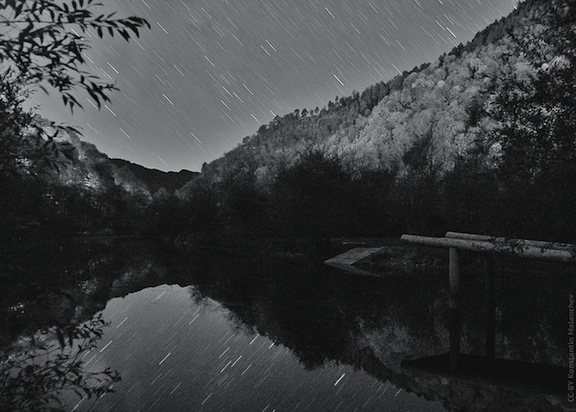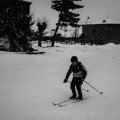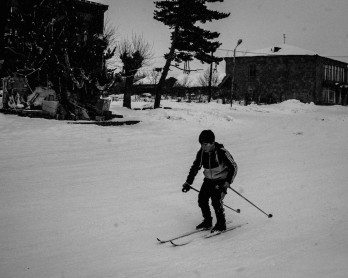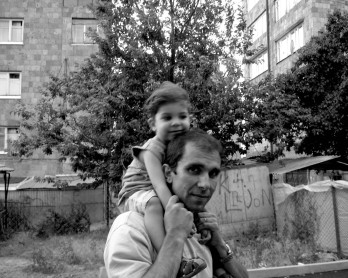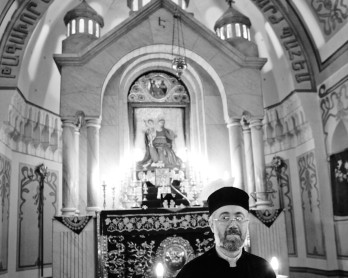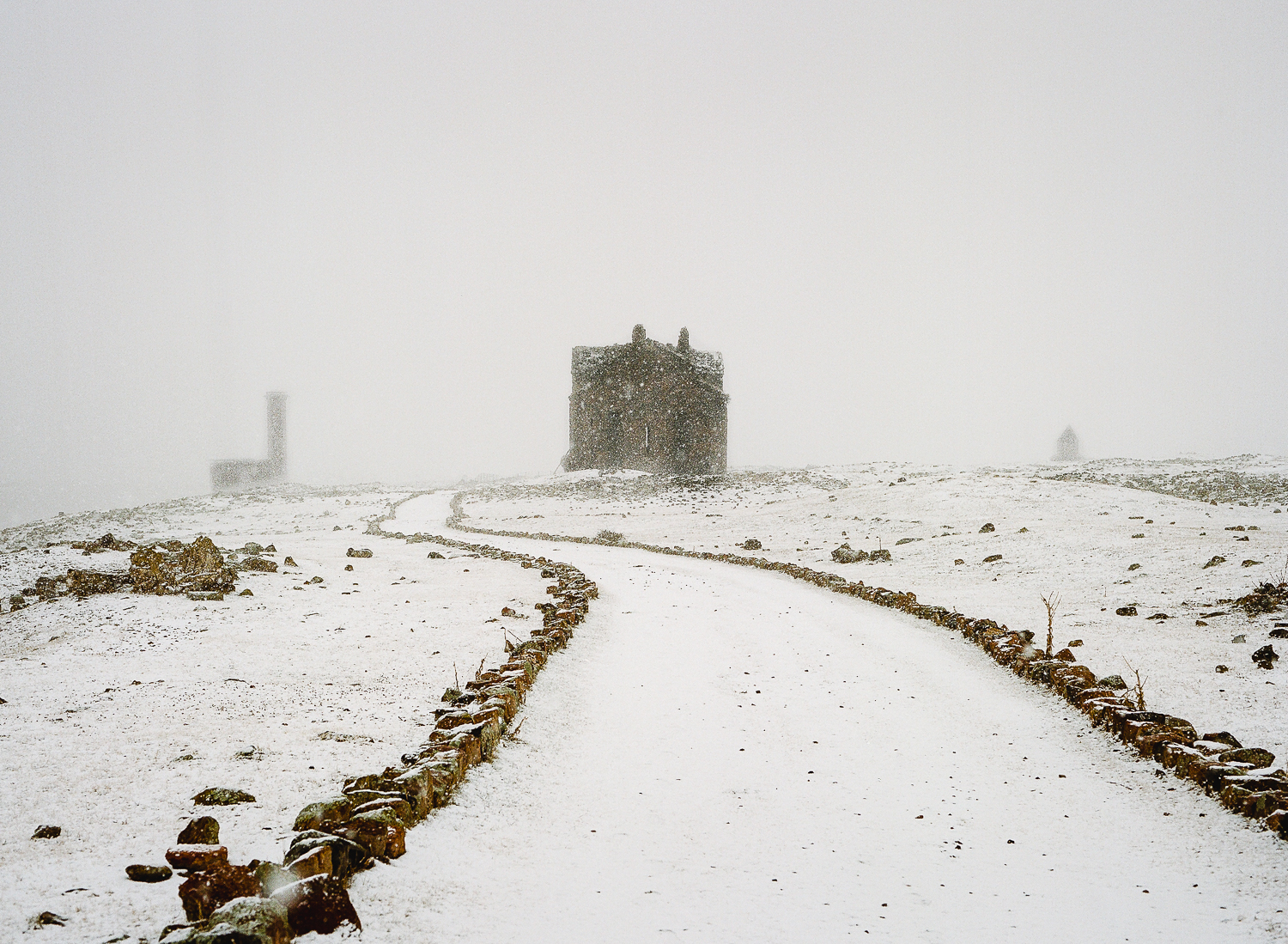Translation: The Demon of Dark Valley by Bakunts
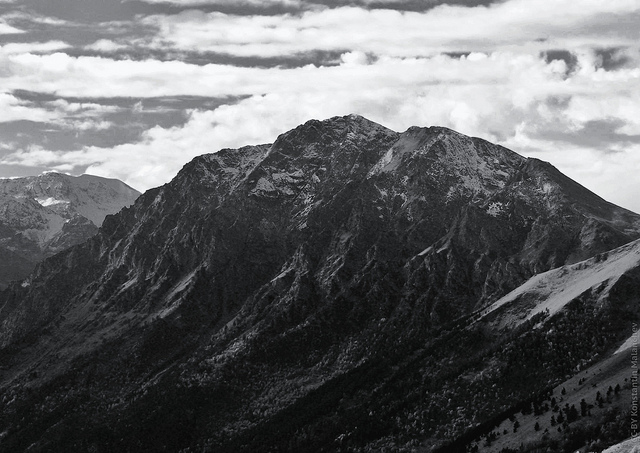
The “Demon” of Dark Valley
By Aksel Bakunts, Translated by Nairi Hakhverdi
An old man sitting on a rooftop scraping the hairy hide of an ox and telling stories to villagers perched on stones–when he got up to tap the hair off his apron, his eye fell on the opposite road, and he put his hand to his forehead so that his good view of the travelers on the road would not be disturbed by the rays of sun in his watery eyes.
“I’d say the other one’s a woman…”
The others looked, too, and for a moment, they forgot all about the old man’s story.
“What pitiless people! How can you sit on a horse when it’s going down?”
“If the horse had been theirs, they wouldn’t be sitting on it…”
The old man started to scrape the hide again with a shard of glass, and when the travelers had disappeared into the opposite forest, the people on the rooftop assumed their former positions to listen to the old man’s story.
“Sakan, you’ll know, don’t you think something happened between those two if they traveled by themselves through those
deserted valleys and mountains?” the old man turned to Sakan and laughed.
“Well, they’re young. Without that it’s…”
“Yes, in those days, too,” the old man resumed his story, “there were many things to be afraid of in the valley. Oh, man, I came out at the top of Dark Valley and a shadow caught my eye. It was a moonlit night, too… Now, neither the shadow goes away, nor am I able to turn around. I’m thinking it’s a bear that hasn’t seen me yet. And then, all of a sudden…”
But right at that moment they heard horse steps from the rooftop and turned around. A woman was standing in the street wearing a man’s hat. The woman tightly held onto her horse’s reins as it kicked the dung in the street.
“Hello,” the woman said. The people sitting on the rooftop lightly nodded.
“Is the head of the council at home?” the woman asked.
Sakan, who had gone down and was holding the horse’s reins, said:
“No, she’s not back from the hayfields yet.”
The woman asked about someone else’s house. Sakan pointed it out with his finger.
“It’s over there, near that big pear tree.”
And when the woman poked the horse’s flanks with the tips of her shoes, Sakan saw the top part of her thin stockings–a ribbon as wide as a finger on the stocking and, above the stocking, pink flesh, which looked like the same ribbon, but a little lighter red.
Sakan returned and sat in his place on one of the stones on the rooftop. They asked him who the woman was looking for.
“She’s come for the women’s meeting,” Sakan replied.
The old man resumed his story about Dark Valley so slowly that it not only seemed as if he were having a hard time remembering it, but that he was also concocting it, decorating it with a thousand and one surprising and intervening incidents.
“I’m running, it’s running after me. I stop, it also stops. And what kind of a demon is it? What kind of a creature? I bent down to pick up a rock…”
“Sakan! Sakan!” his mother called from the rooftop. “Come down! The cow’s giving birth!”
Sakan jumped up, grabbed his crook, and ran from rooftop to rooftop.
“Don’t let her trample her calf! She’s never given birth before!” the old man called after Sakan and then started to tell what the “demon” did when he bent over to pick up a rock.
When he reached their rooftop, Sakan’s ear caught the lowing of the cow through the skylight of their barn.
“Sakan, I hope nothing happens,” his mother said, beating her chest with her fist every time the cow lowed, saying:
“Oh, Maral!”
“It wasn’t supposed to happen today,” Sakan said and opened the barn door. The cow turned at the creak of the door, and the light of the evening gloom fell on her face, and had Sakan looked into the cow’s eyes, he would have seen the first pains of a difficult labor. Instead, Sakan walked up to her and placed his hands on her belly, examining her hanging udders and milk-filled bosom.
“Bring some hay, nana,” and while his mother got hay to spread over the barn stones, Sakan pulled up his sleeves and touched the cow’s hanging belly once more.
Maral’s pains intensified. The cow frequently moved about, pacing up and down, hitting her head against the beam of the stall, and sniffing the barn stones with puffs and pants, and when the little calf in her womb moved some more, Maral became afraid of herself and beat her belly with her tail, as if the thing moving was on her back and she could make it fly up and go away with whips of her tail.
Sakan’s little son appeared by the barn door scratching his belly button wanting to come in, but Nana took him by the arm
and brought him back home.
“Bring the light. Where’s that daughter-in-law of yours?” Sakan asked.
“Who knows? There’s a women’s meeting at the Srans’ house. A woman’s come from the city.”
Sakan remembered the woman sitting on the horse wearing a man’s hat, under which she had gathered her locks and knotted her hair, and her stockings with red ribbons on their fringe.
The cow’s contractions intensified. Her swollen belly heaved, and Maral was weakened by the pain, barely able to stay on her feet.
Sakan didn’t get to express his annoyance at his wife’s absence, but his mother understood him and said:
“But it wasn’t supposed to happen today…”
Soon after, Maral was lying on the hay licking her slimy calf that now opened its eyes and now closed them.
“Oh, oh, Nana! She looks so happy!” Sakan’s son exlaimed. He had come into the barn during the delivery without his father or grandmother noticing, and had hidden in a corner of the barn.
Sakan washed his hands and went to the hayloft to get a basket of hay for the cow.
“Don’t let her lick too much.”
As he passed by the Srans’ house, Sakan stooped and looked through the paper-covered window. The women were sitting on the floor. The newly arrived traveler was talking, moving her hands, and sometimes looking at a book she was holding in her hands. The woman was without a hat. It seemed to Sakan that she had also changed her clothes. She was not wearing white on the horse and her arms were not bare to her elbows.
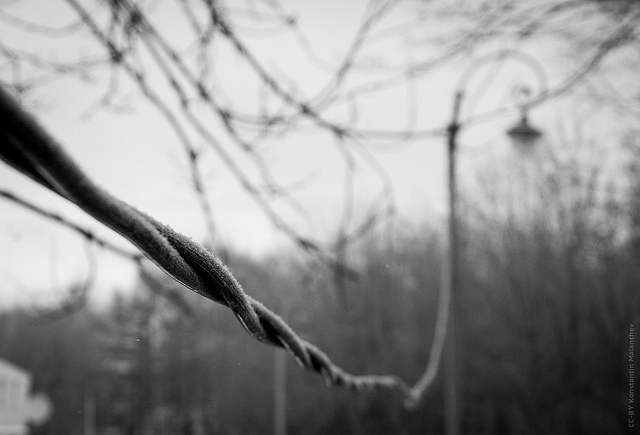
Among the women sitting on the floor, Sakan also saw his wife with a kerchief over her head. She looked so wretched.
Sakan heard footsteps by the door. He quickly turned onto the street and disappeared into the darkness. As Sakan filled the basket with hay in the hayloft, he couldn’t get the image of the woman in a white dress with a book in her hands out of his head.
If someone ran into Sakan that night, they would notice that he was carrying the basket askew. When he passed by the Srans’ house, he wanted to walk up to it, but he didn’t see a light through the window, so he walked on.
The cow was lying on hay ruminating when Sakan put the hay-filled basket in a corner of the barn.
“There’s a guest in the house,” his mother said, picking up the little calf and bringing it to the calf shed. The cow slowly mooed after the calf.
Sakan did not ask who the guest was. He tapped hay from the flaps of his woolen overcoat and walked into the house over the doorstep, and then tapped his overcoat once more. When he looked up, he saw the guest, and his hands froze in midair.
“Comrade Asya is staying with us tonight,” Sakan’s wife said to him.
Asya smiled.
“Was it you who showed me the way under the rooftop?”
“Yes, it was,” Sakan said and moved closer to greet her, and when he shook the guest’s hand, it seemed to him as soft as a newborn calf.
“What a sweet calf,” Asya said.
“Maybe. It could be sweet,” Sakan replied, moving a little away from her.
“And that is our lesson, dear Asya. We’re learning it by heart,” Sakan’s wife called out from the corner and took cups out of the trunk, adding:
“She went to kiss the calf…”
For a moment all three were silent. Asya was looking at the little one sleeping on the rug with his clothes on. He had taken a bite of food, waited for his mother, and fallen asleep right where he had been sitting. Sakan was furtively looking at Asya, at her white dress and arms as he wiped the floor with his finger, even though there was nothing to wipe.
“The calf is in a good place,” Nana said, putting out the petrol lamp in her hand by the door. What a good thing Nana did: coming in and breaking the silence!
Sakan coughed a little, swallowed his saliva, and, casting his glance over Asya’s head to the opposite wall, he asked:
“I’m ashamed to ask, but where’s the friend you came with?”
“We separated in the valley. He went to a village close-by…” Asya answered and sat up. She wasn’t used to sitting on floors. Sakan’s wife noticed and took a pillow from a pile and placed it next to her.
“Lean on it,” she said.
To lean on it, Asya stretched her legs a little and gathered her dress with her hands. Sakan cast his eye on the patterns of the carpet to avoid seeing what he had seen when she was on the horse. He recalled the old man’s question:
“Sakan, you’ll know, don’t you think something happened between those two?”
How was Sakan supposed to know? Maybe nothing happened. Maybe the friend who traveled to the neighboring village was Asya’s brother or cousin. Asya was playing with the tassels of the rug with her fingers, and when Sakan looked at her, it was as if he wanted to check with whom she had been on that mountain road. Maybe something had happened.
“So you always go around villages, do meetings, and give lectures?” Sakan asked. Asya laughed and through her laugh she said “yes” and nodded. Sakan noticed how clean her teeth were and how a lock of hair loosened from the knot and dropped on her brow when she nodded—he saw that and he didn’t like Asya’s laugh.
If the old man sitting on the roof scraping the hide of an ox had asked Sakan at that instant whether something had happened between them, Sakan would not only say “Well, they’re young. Without that it’s…” but he would also invent and imagine the story, and tell it to the people sitting on the rooftop in the same way the old man told about the forgotten “demon” of Dark Valley.
Sakan’s wife laid out a cloth on the floor and placed bread, cheese, and yoghurt on it. Sakan approached the cloth, tore off the good parts of the bread, and put them in front of Asya. He wanted to put the yoghurt bowl in front of her as well, but pulled back and put the bowl down.
During the meal Sakan’s eye was on Asya’s small bites. He was fascinated by how she ate. Asya rolled up thin slices of lavash,1 nibbled them a few times, and then swallowed unnoticeably. Sakan, on the other hand, ripped the lavash in half, crushed cheese on it with his fingers, and rolled everything up like a bale of hay.
After putting the child to bed, Sakan’s wife sat in front of the cloth and began to eat. To Sakan it seemed as if his wife ruminated like an old cow. She mixed the bread with spit and extended her neck a little when she swallowed.
While Sakan’s wife was clearing the cloth and making the bed, his mother probed Asya. When asked whether she had a child, Asya laughed and answered:
“Nana, I’m not even married!”
Nana only thought to herself “How’s that possible?” and was stunned that a grown woman could be unmarried and have no children.
“I’m a party member, nana. I’m not my own boss,” Asya said, having seemingly understood that Nana was puzzled and perhaps questioned her behavior. But Nana did not understand the meaning of her words even when her daughter-in-law rushed to explain what a party was.
As Sakan’s wife bowed her head a little and timidly explained what a party was to her mother-in-law, she peeked at Asya, as if she wanted to ask whether she had memorized the lesson correctly, and Asya was looking at her with delight. The mother-in-law was also looking at her daughter-in-law: she was both happy that her son’s wife was not a member of the party and also worried that in the end she might learn things at the meetings and change her mind.
Sakan was playing with the tassels of the carpet on the kursi,2 listening to what his wife was saying. And when his wife finished, Sakan got up, asked where the barn lamp was, and went to the barn scratching his shoulder.
The fuzzy little calf was lying on hay licking its lips with its tongue. The cow now ate fresh grass and now turned her head to the calf and moaned. Sakan filled the stall with hay and stood next to the cow a little longer with the lamp in his hand.
Asya was already in bed when he came home. Next to the bed were her clothes, among which was her white dress that looked, to Sakan, like a little mound of snow. When he passed her bed to go to the other side of the room where his bed and the child’s crib were, a pleasant fragrance reached his nose, as if someone had plucked flowers from the mountain, squeezed them, extracted the juice, and sprinkled it like water on the kursi, the floor, and the charred ceiling. But when he sat on his bed and took off his leather shoes, the pungent stench of the barn, the dirt stuck on his shoes, and the smell of blades of hay hit his nose. In this corner of the room hung the smell of an unwashed bedspread, a shirt drenched in sweat a thousand times, a sunburned overcoat, and an unwashed body.
Sakan ordered his mother to get the sickle ready for him to bring fresh green grass for the cow in the morning. He wrapped himself under the thick blanket and sleep gradually descended on his exhausted body. It seemed to him as he were rocking on the surface of water: he is bobbing up and down, and on the surface of the water there is a white dress that also rocks.
When his wife raised one end of the blanket and turned to Sakan, Sakan squinted his eyes and saw that the light had already been turned off. He quietly asked his wife why there was a rug under her head instead of a pillow.
“I gave our pillow to her,” his wife said and moved closer to him. Sakan’s nose was struck by a strong smell that came out of his wife’s mouth, as if her teeth had corroded and rotten. He turned to his other side and faced the wall, amazed that until then he had never noticed the smell of his wife’s mouth.
* * *
The morning sunbeam had dropped through the skylight, forming a milky circle on the rug, when Sakan woke up and put on his shoes.
When he walked past Asya he saw her white dress, her neck, a bit of her shoulder, and a thin strap of white cloth on her shoulder. He quickly went to the door, picked up his sickle, and went out.
He washed his face by the stream in front of the house, wiped it with the fringe of his overcoat, and descended into the valley to chop grass in the garden. On his way there Sakan wondered about whether Asya was sleeping naked or whether she was wearing a blouse. If she was wearing a blouse, then why was her shoulder bare? Or maybe the white dress next to her was her blouse.
The cow frequently looked at the barn door, licked her calf, and rubbed her neck against the beams of the stall to scratch herself. Everyone in the house had already woken up, tidied the beds, and his wife had turned on the fireplace and was making tea when Sakan came home with two bales of fresh grass on his back.
Asya was standing next to Sakan when he scattered the grass in front of the cow. She laughed when the calf turned its face to the green grass, sniffed it, and staggered away on its feet, burying its head in its mother’s bosom.
Asya picked out a few flowers in the grass and brought them to the calf. The cow felt that, swished her tail, and briskly turned her head. If she hadn’t been tied to the stall, she might have butted her. Asya recoiled and the flowers fell from her hand.
After she had made the tea, Sakan’s wife brought water to wash Asya’s face with. Even though Asya declined and took the basin to pour water on her own hands, his wife rejected the idea.
Sakan was standing by the barn door. He saw how Asya washed herself. She put water in her mouth a few times, puffed up her cheeks, rubbed her teeth with her finger, gargled, and spat out the water. Sakan recalled how bad his wife’s mouth smelled.
“Well, everything is learned from what we see our mothers do…”
Asya once again ate very little at breakfast. On the one hand it was his mother who was urging her on and, on the other, it was his wife.
“Eat, you’re traveling, you’ll be hungry…”
Asya laughed and said:
“What I ate will last me three days.”
Nana was puzzled and concluded in her mind that Asya was not healthy, that she was hollow inside, that she must have some sort of disease that is preventing her from eating much.
Then Sakan got up and got Asya’s horse from the neighbor’s barn. A few women had gathered on the rooftop. Asya was saying something or other to them. Sakan was saddling the horse and what he overheard was Asya promising to visit the village again.
The horse was already saddled when the women came down from the rooftop. Asya shook Nana’s hand, stooped to kiss the child’s cheek, and walked to the horse to mount it. Sakan was holding the reins. Asya put her hand on the saddle and tried to mount the horse, and her foot almost slipped out of the stirrup had it not been for Sakan holding her leg and helping her get on the horse.
Asya said goodbye to Sakan, shook his hand, and went down the road. The women accompanied her to the border of the village, held her horse, talked a little bit more, showed the way to the neighboring village, and separated. The women scattered through the village streets. Asya clutched the reins tightly and kicked the horse’s flanks with her heels: the horse sped up.
Sakan stood frozen for a moment and then walked over to the barn door, but remembered that he was meant to go to the garden. He turned around and went down into the valley.
When he helped Asya mount the horse and held her leg, it was as if his fingers sank into something soft. When he bent over to put her foot in the stirrup, the tail of Asya’s coat rose and Sakan saw her white dress.
Sakan watered the garden all day.
The runnel was tied under the trees and while it reached its destination Sakan lay on his back and partly closed his eyes.
The trees knocked the branches together and the leaves rubbed against each other. Whenever the branches separated a little and Sakan could see the blue sky through a gap, it seemed to him as if the clouds were the white dress that had been at his house by the bed the night before.
It was already dark when he returned to the village. He threw his shovel aside and went to look at the cow. He went home to his wife and grumbled that she had left the cow thirsty. His wife wanted to tell him that she was weeding the vegetable garden and had not been home, but she kept it to herself, laid out the cloth, and placed bread, cheese, and yoghurt on it.
Sakan ate well, didn’t make a sound when he ate, and kept his head lowered. As he swallowed his last bite, he muttered under his beard:
“Make my bed and put that whetstone by the door so I can take it with me in the morning.”
He said that and loosened his belt.
When he laid his head on the pillow, Sakan once again smelled the fragrance that had emanated from Asya’s clothes. That same pillow had been under her head the night before.
Sakan buried his face in the pillow, flared his nostrils, and started to breathe deeply. Before his eyes were swaying shoulders, a white dress, and soft feet.
His wife turned off the light and quietly wrapped herself under the sheets. Sakan felt his back warming up and he turned to face his wife. There was a pleasant scent under the sheets, and when Sakan held his wife, it was as if his wife’s shoulder was also bare and that she, too, was wearing a snow-white dress. His wife did not understand why Sakan was so furious that night. And in her mind she forgave him for what he had done the night before when he turned to the wall.
His wife had softly fallen asleep and in another corner of the house Nana was sleeping. In the dead of the night, Sakan was listening to the cows ruminating in the barn through a crack in the wall.
He brought to mind how the cow had wanted to butt Asya when she brought a flower to the calf’s snout. Sakan also recalled the first day when they had been sitting on the rooftop. The old man was telling a story of how on a moonlit night the “demon” had appeared in Dark Valley and how it was after him.
“I was running, and he was running after me. I stopped, he also stopped…”
It was right then that comrade Asya appeared.
Until the middle of the night Sakan was half-asleep, half-awake. The moon had cast a ray from the skylight and was playing on the rug. Sakan fell asleep close to dawn.
In his dream he saw Dark Valley: a woman wearing a white dress was running after him in the valley, she would get closer to catch him, then she would stop and run off again into the valley laughing.
1927
Nairi Hakhverdi was born in the Netherlands and currently lives in Armenia. She translates Armenian literature into English and teaches literary translation at Yerevan State Linguistic University after V. Brusov.
Bakunts, real name Alexander Stepani Tevosyan was born in Goris in Russian Armenia in 1899. After studying agriculture in Ukraine, he became an agronomist who traveled through the Armenia, providing help and knowledge to farmers and villages while working as a journalist and a village school teacher.
He wrote prolifically between 1926 and 1937, with his first bundle of short stories appearing under the title “Mtnadzor” or “Dark Valley,” chronicling rural Armenian life just before and after the Communist Revolution. In 1937 he was arrested by the Stalinist regime on charges including nationalism and estrangement of socialist values. He was executed by firing squad after a twenty-five-minute trial. His works were banned in Soviet Armenia until the 1960s.
Photos of the Caucasus and surrounding region by
Konstantin Malanchev/ Flickr via Creative Commons

